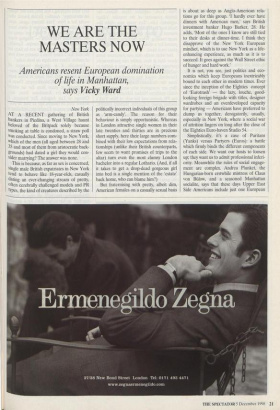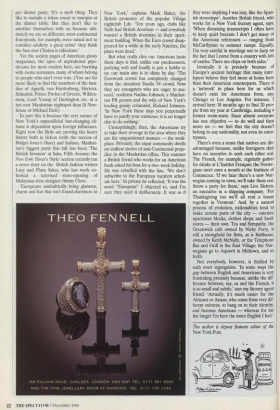WE ARE THE MASTERS NOW
Americans resent European domination of life in Manhattan,
says Vicky Ward New York AT A RECENT gathering of British bankers in Piedina, a West Village haunt beloved of the Britpack solely because smoking at table is condoned, a straw poll Was conducted. Since moving to New York, Which of the men (all aged between 28 and 35 and most of them from aristocratic back- grounds) had dated a girl they would con- sider marrying? The answer was none.
This is because, as far as sex is concerned, single male British expatriates in New York tend to behave like 18-year-olds, casually dating an ever-changing stream of pretty, Often cerebrally challenged models and PR types, the kind of creatures described by the politically incorrect individuals of this group as 'arm-candy'. The reason for their behaviour is simply opportunistic. Whereas in London attractive single women in their late twenties and thirties are in precious short supply, here their large numbers com- bined with their low expectations from rela- tionships (unlike their British counterparts, few seem to want promises of trips to the altar) turn even the most clumsy London bachelor into a regular Lothario. (And, if all it takes to get a drop-dead gorgeous girl into bed is a single mention of the 'estate' back home, who can blame him?) But fraternising with pretty, albeit dim, American females on a casually sexual basis is about as deep as Anglo-American rela- tions go for this group. 'I hardly ever have dinners with American men,' says British investment banker Hugo Barker, 28. He adds, 'Most of the ones I know are still tied to their desks at dinner-time. I think they disapprove of the New York European mindset, which is to use New York as a life- enhancing experience, as much as it is to succeed. It goes against the Wall Street ethic of hunger and hard work.'
It is not, you see, just politics and eco- nomics which keep Europeans inextricably bound to each other in modern times. Ever since the inception of the Eighties concept of 'Eurotrash' — the lazy, louche, good- looking foreign brigade with titles, designer wardrobes and an overdeveloped capacity for partying — Americans have preferred to clump us together, derogatorily, usually, especially in New York, where a social war of attrition lingers on long after the close of the Eighties Euro-haven Studio 54.
Simplistically, it's a case of Puritans (Yanks) versus Partyers (Euros): a battle which firmly binds the different components of each side. We want our hosts to loosen up; they want us to admit professional inferi- ority. Meanwhile the rules of social engage- ment are complex. Andrea Plunket, the Hungarian-born erstwhile mistress of Claus von Billow, and a seasoned Manhattan socialite, says that these days Upper East Side Americans include just one European per dinner party. 'It's a snob thing. They like to include a token count or marquis at the dinner table. But they don't like to smother themselves with us because ulti- mately we are so different; most continental Europeans, for example,. were raised not to consider adultery a great crime' they think the fuss over Clinton is ridiculous.'
Yet the society pages of American glossy magazines, the apex of aspirational pipe- dreams for most readers here, are bursting with exotic surnames, many of whom belong to people who can't even vote. (You are far more likely to find the members of the fam- ilies of Agnelli, von Fiirstenburg, Herrera, Schnabel, Prince Pavlos of Greece, Wilden- stein, Lord Young of Dartington etc. at a hot new Manhattan nightspot than Si New- house or Michael Dell.) In part this is because the very nature of New York's unparalleled fast-changing cli- mate is dependent upon foreign influences. Right now the Brits are proving the heavy hitters both in fiction (with the success of Bridget Jones's Diary) and fashion. Manhat- tan's biggest party this fall has been 'The British Invasion' at Saks, Fifth Avenue; the New York Times's 'Style' section recently ran a cover story on the British fashion writers Lucy and Plum Sykes, who last week co- hosted a televised store-opening of Malaysian shoe designer Jimmy Choo.
'Europeans undoubtedly bring glamour, charm and fun that isn't found elsewhere in New York,' explains Mark Baker, the British promoter of the popular Village nightclub Life. 'Ten years ago, clubs like Nells had British doormen — and everybody wanted a British doorman in their apart- ment building. When the Euro crowd disap- peared for a while in the early Nineties, the place went dead.'
But what really riles our American hosts these days is that, unlike our predecessors, partying well and loudly is just a hobby to us; our main aim is to shine by day. 'The Eurotrash crowd has completely changed from the decadent Studio 54 crowd. Now they are youngsters who are eager to suc- ceed,' confirms Nadine Johnson, a Manhat- tan PR person and the wife of New York's leading gossip columnist, Richard Johnson. 'In New York these days you perpetually have to justify your existence; it is no longer chic to do nothing.'
Unsurprisingly, then, the Americans try to take their revenge in the area where they are the unquestioned masters — the work- place. Privately, the expat community dwells on endless stories of anti-Continental preju- dice in the Manhattan office. This summer a British friend who works for an American bank asked his boss for a two- week holiday. He was rebuffed with the line, 'We don't subscribe to the European vacation sched- ule here.' In private he reflected, 'It was the word "European" I objected to, and I'm sure they used it deliberately. It was as if they were implying I was lazy, like the Span- ish stereotype'. Another British friend, who works for a New York literary agent, says, `When discussing manuscripts I often have to keep quiet because I don't get many of the American references — ranging from McCarthyism to summer camps. Equally, I'm very careful in meetings not to harp on the fact that I come from a country with lots of castles. There are chips on both sides.' Ironically it is precisely because of Europe's ancient heritage that many inter- lopers believe they feel more at home here than their American counterparts. There is a 'network' in place here for us which doesn't exist for Americans from, say, Chicago or Los Angeles. For instance, I arrived here 18 months ago to find 20 peo- ple from my year at Cambridge, including a former room-mate. Since almost everyone has one objective — to do well and then move on — we feel that the city doesn't belong to any nationality, not even its coun- trymen.
There's even a sense that natives are dis- advantaged because, unlike foreigners they have no incentive to seek each other out. The French, for example, regularly gather for drinks at L'Institut Francais; the Norwe- gians meet once a month at the Institute of Commerce: 'If we hear there's a new Nor- wegian coming to town, we'll take them out, throw a party for them,' says Live Sletten, an executive in a shipping company. 'For Thanksgiving too we'll all rent a house together in Vermont.' And, by a natural process of evolution, nationalities tend to make certain parts of the city — eateries, apartment blocks, clothes shops and food- stores — their own. Tea and Sympathy, the Greenwich café owned by Nicky Perry, is still a stronghold for Brits, as is Balthazar, owned by Keith McNally, or the Telephone Bar and Grill in the East Village; the Nor- wegians go to Aquavit in Midtown, and so forth.
Not everybody, however, is thrilled by such overt segregation. 'In some ways the gap between English and Americans is very frustrating precisely because, unlike the dif- ference between, say, us and the French, it is so small and subtle,' says my literary agent friend. 'Actually, it's much easier for the Africans or Asians, who come from very dif- ferent cultures, to hang on to their identity, and become American — whereas for me the longer I'm here the more English I feel.'
Tha author is deputy features editor of the New York Post.



















































































 Previous page
Previous page